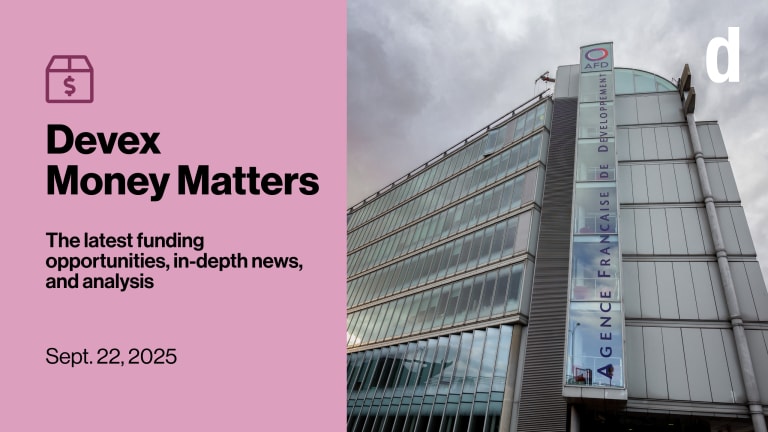Jeremy Farrar: Steering Wellcome into 'truly' international waters
How is the world's second-biggest charitable foundation making itself truly global? And why do international organizations need better funding, more support and a genuine mandate to tackle crises like Ebola? Devex talks to Jeremy Farrar, director of the Wellcome Trust.
Wellcome Trust Director Jeremy Farrar is not the typical charitable foundation chief. A world-class neurologist, research scientist and professor of tropical medicine, he built his career on the other side of the funding equation. Most recently, this was as head of the Wellcome-funded Oxford University Clinical Research Unit in Ho Chi Minh City, Vietnam, where he lived and worked for 18 years before the Trust lured him to London in October 2013. On top of a nomadic upbringing — born in Singapore, Farrar spent most of his childhood in Asia and the Middle East, before a degree in medicine brought him to University College London — those years in Vietnam instilled in him a passionately global view that he is keen to infuse throughout the foundation. The Wellcome Trust could of course never be accused of parochialism. Although it is just as committed to health-related research in the U.K. as anywhere else in the world — Farrar is keen to stress that while its work often contributes to international development, this is not its mission — the geographical reach of its more than 750 million pounds ($1.14 billion) annual funding is evidence of its global impact. Founder Henry Wellcome, an American-born pharmaceutical entrepreneur whose collection of international artifacts at one time contained more items than the Louvre Museum in Paris, was “very committed to international affairs long before it became a topical subject,” Farrar noted. The U.K. too, with its strong science base and a commitment to lower- and middle-income countries that is “without parallel,” is a “fantastic place for Wellcome to be hosted.” However, Farrar asserts that he would like the Wellcome Trust to become “a truly global organization,” working across borders in countries that traditionally don’t work together. “It could play a much more significant role in terms of its global reach,” Farrar said. “Wellcome Trust has a responsibility to contribute to that global agenda.” Shifting ‘the center of gravity’ Being a stronger international organization by Farrar’s definition, however, means less, not more, centralized power. One shift in Wellcome’s strategy that he is spearheading is a drive to move more decision-making away from the Trust’s London headquarters and embed it in the countries and projects that such judgments affect. Farrar’s time overseas — during which his research unit was the recipient of Wellcome funding — helped trigger a “realization that being on the receiving end of something that’s decided a very long way from where you are doesn’t go down well, whether it’s me sitting here in London being told what to do from somewhere in Washington or Geneva or vice versa,” he said. “And that doesn’t matter whether you’re Vietnamese, British, American or Libyan.” Efforts to “shift the center of gravity” in terms of Wellcome’s decision-making are already demonstrated by its support of a new science funding platform for Africa that will formally launch in June. Also funded by the Bill & Melinda Gates Foundation and the U.K. Department for International Development, the Alliance for Accelerating Excellence in Science in Africa will continue Wellcome’s efforts toward developing the next generation of African research leaders, but now via the African Academy of Sciences. While in the past, Wellcome funded the development of research talent on the continent in a “very good but fairly traditional way” — with strategy and money both coming directly from London — decisions will now be made in Nairobi and ultimately from four regional hubs across Africa. “The decision-making and the setting of priorities will be firmly based in Africa, addressing African issues,” Farrar said. “The shifting of that power base, such that the questions asked and therefore the answers given are based closer to where the problems lie, will help bring a greater degree of ownership to what goes on than where all the decisions are based in Western countries.” Similarly, at the Wellcome Trust DBT India Alliance — a project that aims to help train future Indian research leaders — decision-making, funding, interviews and the peer reviews are all now based in New Delhi. Farrar’s long-term aim is that the devolution of power witnessed within both of these projects will eventually become the norm for Wellcome Trust funding. Taking the lead from ‘locals on the ground’ The Ebola crisis is one case in point of how global organizations involved in tackling such outbreaks need to take more lead from locals on the ground, said Farrar, one of two scientists who in 2004 first identified the H5N1 bird flu in humans, and before that was also in the front line of battling severe acute respiratory syndrome, to which he lost friends and colleagues. “Through personal experience going back through SARS, through bird flu, through hand, foot-and-mouth disease in Southeast Asia, through cholera in Haiti, one of the key lessons is that unless there is local ownership … and an appreciation of the local situation, context, environment and society, whatever magic bullet you have or have not got, it would be much, much harder to implement,” he said. The speed with which Ebola spread also reflects societal changes that international organizations involved in its control were “too slow to appreciate,” said Farrar, who has been fiercely critical of the World Health Organization’s response to Ebola and what he has described as its bloated structure. This is in stark contrast to international medical group Médécins Sans Frontières, which he said has “quite rightly” been applauded for its work with Ebola and has “demonstrated what is possible.” The world has changed dramatically since 1976 when the first case of Ebola was discovered, Farrar said. At that time, it was a disease mostly seen in small rural communities, and this perception of the disease stuck. Now, around 60 percent of the world’s population lives in big cities, with that percentage expected to rise to 80 percent within 20 years. As happened with Ebola, “this will have a dramatic impact on the way infections spread, on their capacity to spread much more broadly than when people were living in small, rural collections of populations in villages,” Farrar said. “Once those sort of infections come into a major urban center, whether Monrovia or Freetown or anywhere else, the people there are living much more closely together, they’re much more connected, they travel much more broadly.” Giving ‘real teeth’ to global organizations International organizations need to mirror that by being more linked up and nimble, Farrar said. They also need to be given “real teeth” in a world that is very different to when many of the current global governance structures were put in place post-World War II. “I’m a great believer in global organizations — no single country must dominate this,” Wellcome’s director said. However, “we need to provide those global organizations — whether the WHO, the United Nations or the World Bank — with the mandate and the tools to offer the leadership that’s required.” Farrar argued that “gradual but deliberate” cuts to these organizations’ funding and their leadership’s reduced authority and mandate contributed to the slow Ebola response. “I think the lesson there is not to break them all up and start again ... It’s to strengthen those bodies, because ultimately we do need a global governance for health, as we need a global governance for finance. But we must then provide them with the authority and accountability to deliver that mandate,” he explained. Wellcome’s independence and the fact that “research is at our heart” means it also has a bigger role to play in providing the evidence base that other organizations could make more use of in their decision-making. On the back of this evidence, “one might hope better policy decisions are made and better policy decisions are implemented.” Ultimately, global organizations — Wellcome included — need to arm themselves for future pandemics not by modeling their response on past outbreaks, but by asking themselves where and how infections like Ebola or influenza might emerge and spread next, Farrar said. “We’ve got to prepare for the future, not the past.” What are your thoughts on Farrar’s efforts to move decision-making away from London and to “learn from locals on the ground” as a way to turn Wellcome Trust into a stronger international organization? Let us know by leaving a comment below. Check out more insights and analysis for global development leaders like you, and sign up as an Executive Member to receive the information you need for your organization to thrive.
Wellcome Trust Director Jeremy Farrar is not the typical charitable foundation chief.
A world-class neurologist, research scientist and professor of tropical medicine, he built his career on the other side of the funding equation. Most recently, this was as head of the Wellcome-funded Oxford University Clinical Research Unit in Ho Chi Minh City, Vietnam, where he lived and worked for 18 years before the Trust lured him to London in October 2013.
On top of a nomadic upbringing — born in Singapore, Farrar spent most of his childhood in Asia and the Middle East, before a degree in medicine brought him to University College London — those years in Vietnam instilled in him a passionately global view that he is keen to infuse throughout the foundation.
This story is forDevex Promembers
Unlock this story now with a 15-day free trial of Devex Pro.
With a Devex Pro subscription you'll get access to deeper analysis and exclusive insights from our reporters and analysts.
Start my free trialRequest a group subscription Printing articles to share with others is a breach of our terms and conditions and copyright policy. Please use the sharing options on the left side of the article. Devex Pro members may share up to 10 articles per month using the Pro share tool ( ).
Helen Castell is a London-based financial journalist with nearly 20 years’ experience covering trade, energy and risk for TXF, Shares Magazine, Global Trade Review, Newsbase, Trade Finance Magazine and other Euromoney publications. At Devex, she writes about development banking, private sector engagement and funding trends. She studied English Literature at Sheffield University and International Journalism at London’s City University, and speaks English, Spanish and Japanese.








